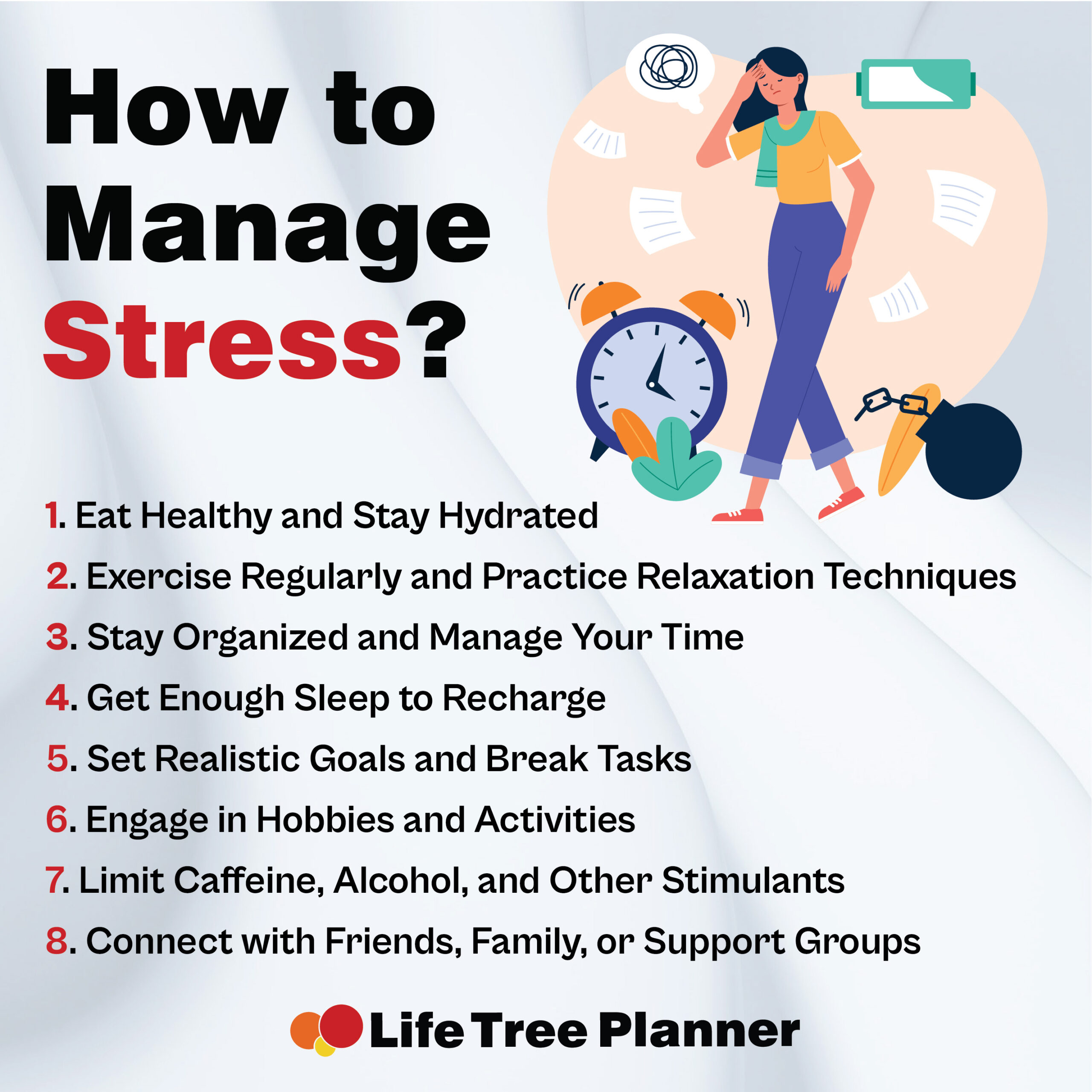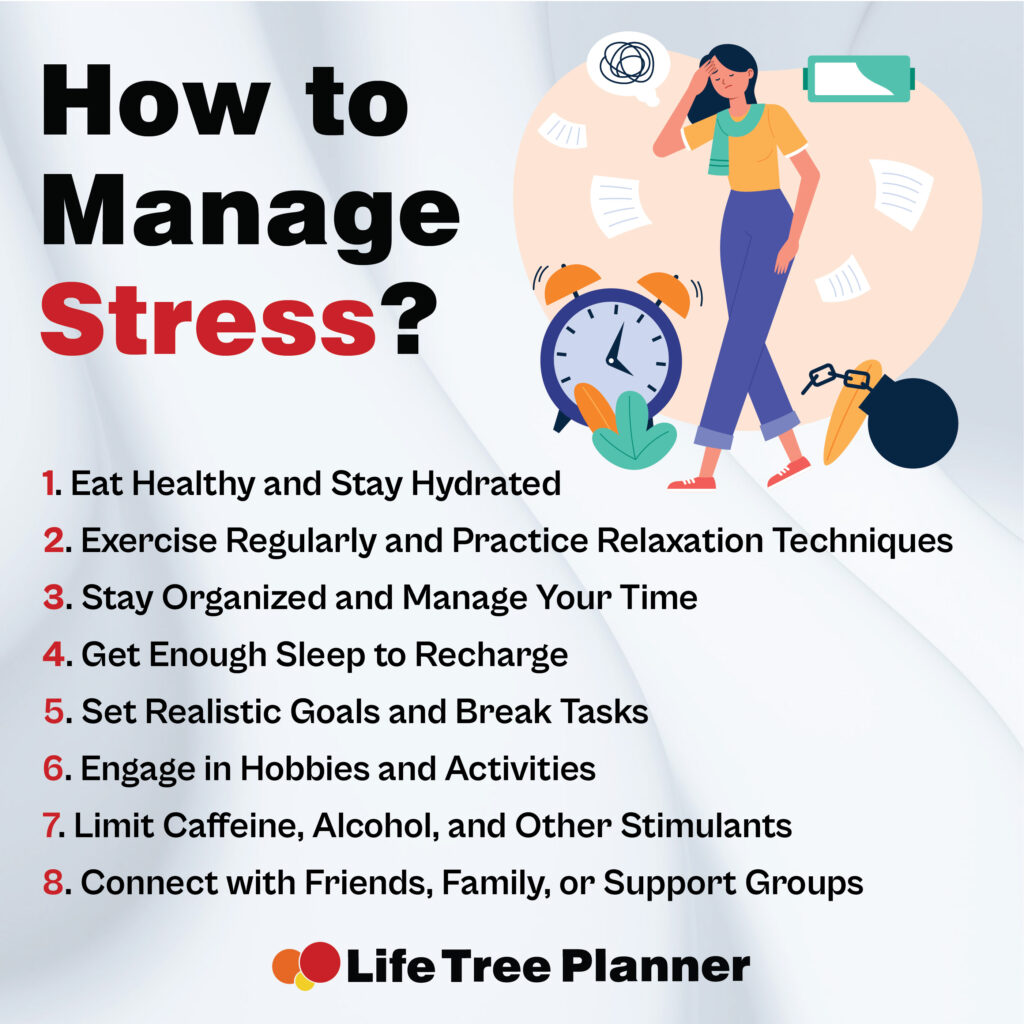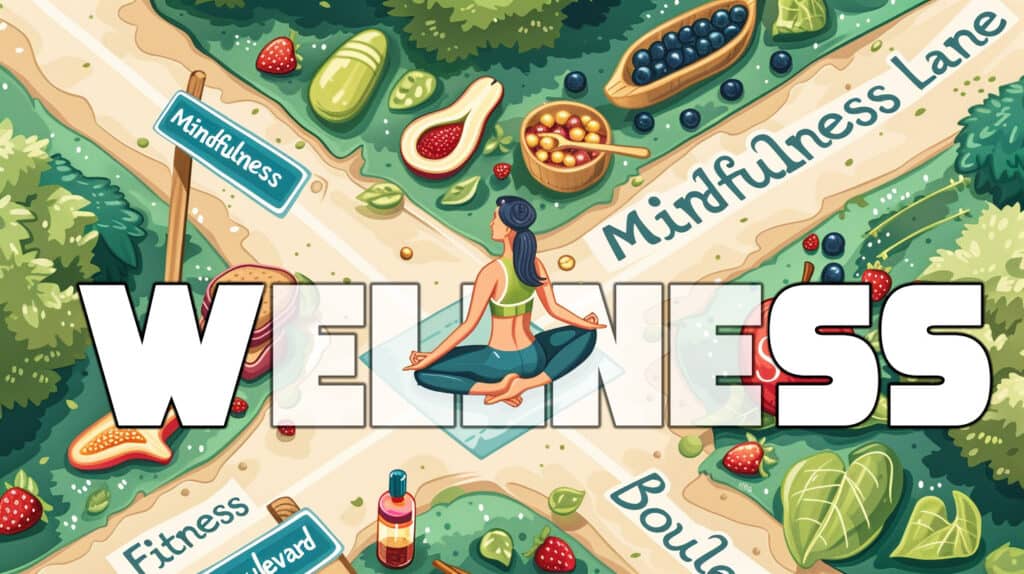
Feeling overwhelmed by life’s demands? You’re not alone. Stress is a common challenge, but with the right approach, you can regain control and find balance.
You are the hero in this story, striving to manage stress and improve your well-being. As your guide, I offer practical and effective solutions to help you navigate this journey.
In this article, you’ll discover eight actionable strategies to tackle stress head-on . And you’ll find detailed tips, strategies, and options for each area of stress management.
By following these guidelines, you’ll experience greater peace and resilience, transforming your daily life.
Start this journey by exploring the strategies outlined, and you’ll be on your way to a more balanced and stress-free life.

- 1. Eat Healthy and Stay Hydrated
- 2. Exercise Regularly and Practice Relaxation Techniques
- 3. Stay Organized and Manage Your Time
- 4. Get Enough Sleep to Recharge
- 5. Set Realistic Goals and Break Tasks
- 6. Engage in Hobbies and Activities
- 7. Limit Caffeine, Alcohol, and Other Stimulants
- 8. Connect with Friends, Family, or Support Groups
- How to Manage Stress? A Recap
Here Are 8 Effective Strategies for Managing Stress:

- Eat Healthy and Stay Hydrated: Nourish your body with balanced meals and plenty of water to support overall health and reduce stress.
- Exercise Regularly and Practice Relaxation Techniques: Engage in physical activity and relaxation methods like deep breathing and meditation to help alleviate stress and improve mood.
- Stay Organized and Manage Your Time: Keep your environment and schedule organized to reduce feelings of chaos and overwhelm, making stress more manageable.
- Get Enough Sleep to Recharge: Prioritize quality sleep to allow your body and mind to recover, which helps in handling stress more effectively.
- Set Realistic Goals and Break Tasks: Establish achievable goals and divide tasks into manageable steps to prevent feeling overwhelmed and reduce stress.
- Engage in Hobbies and Activities: Pursue interests and hobbies that bring joy and relaxation, providing a healthy escape from daily stressors.
- Limit Caffeine, Alcohol, and Other Stimulants: Reduce intake of substances that can increase anxiety and disrupt your body’s natural stress response.
- Connect with Friends, Family, or Support Groups: Build a strong support network to share experiences and receive emotional support, helping to alleviate stress.
See also How to Gain Confidence? 7 Powerful Strategies for Lasting Self-Belief
1. Eat Healthy and Stay Hydrated

Eating healthy and staying hydrated are essential for managing stress in a natural way. A good diet plan provides good nutrition, supporting both mental and physical health. A healthy diet helps regulate blood flow, strengthens the immune system, and can lower stress levels, reducing the risk of serious illness.
Proper hydration also improves cognitive function and supports wellness. Healthy ways to combat stress, such as maintaining balanced meals and avoiding illegal drugs, contribute to overall well-being.
Incorporating progressive muscle relaxation with a nutritious diet boosts mental resilience. By focusing on good nutrition, you can better manage chronic stress and protect your mental health from long-term effects.
Here’s a list of 10 foods that can help manage stress:
- Leafy Greens – High in magnesium, helping to regulate stress hormones.
- Citrus Fruits – High in vitamin C, which helps reduce stress hormones.
- Fatty Fish (Salmon, Tuna) – Rich in omega-3 fatty acids that support brain health and reduce anxiety.
- Berries – Packed with antioxidants, which help reduce oxidative stress.
- Nuts (Almonds, Walnuts) – Contain healthy fats and vitamin E for improved mood and brain function.
- Avocados – Full of B vitamins, which are important for stress relief.
- Dark Chocolate – A small amount can lower stress hormone levels.
- Whole Grains – Help stabilize blood sugar levels and promote relaxation.
- Herbal Teas (Chamomile, Green Tea) – Known for their calming properties.
- Yogurt – Contains probiotics that support gut health and mood regulation.
2. Exercise Regularly and Practice Relaxation Techniques
Regular physical activity is one of the healthiest ways to relieve stress and improve both mental and physical health. Activities like jogging, gym workouts, or even walking can help reduce muscle tension and increase endorphins, which naturally improve mood.
In addition, practicing relaxation techniques like deep breathing, shower meditation, or deep meditation can significantly reduce stress levels. Incorporating these leisure activities into your routine helps manage stress effectively.
Creating a gym vision board or setting small fitness goals can motivate consistency. Combining physical activity with relaxation techniques offers a balanced approach to stress management, allowing you to cope with life’s challenges more efficiently.
Here’s a list of 14 exercises and relaxation techniques:
- Tai Chi: A gentle martial art combining slow movements and deep breathing to improve balance and reduce stress.
- Body Scan Meditation: A mindfulness practice where you mentally scan your body from head to toe, identifying and releasing tension.
- Jump Rope: A high-intensity cardio exercise that boosts mood and cardiovascular health while releasing endorphins.
- Qigong: A practice involving slow, deliberate movements and breathing exercises to enhance energy flow and reduce stress.
- Visual Relaxation Techniques: Techniques such as guided imagery that involve imagining peaceful scenes to calm the mind.
- Kettlebell Workouts: Strength training exercises with kettlebells that build muscle and reduce stress through physical exertion.
- Guided Visualization: A relaxation technique where you follow verbal guidance to imagine calming and stress-relieving scenarios.
- Rowing: A full-body workout that combines cardio and strength training, promoting stress relief through rhythmic movement.
- Self-Massage Techniques: Methods like foam rolling or hand massage to relieve muscle tension and promote relaxation.
- Biking: An outdoor or stationary exercise that improves cardiovascular health and reduces stress through physical activity.
- Floatation Therapy: Immersion in a float tank filled with Epsom salt solution to create a zero-gravity environment that promotes relaxation.
- Resistance Band Exercises: Using bands for strength training helps improve muscle tone and manage stress through physical exertion.
- Nature Walks: Walking in natural settings to benefit from fresh air and the calming effects of nature, reducing stress levels.
- Progressive Relaxation: A technique where you tense and then relax different muscle groups to relieve physical and mental tension.
3. Stay Organized and Manage Your Time

Staying organized and managing your time effectively are crucial for reducing stress and maintaining a healthy work-life balance. Create a detailed to-do list to track responsibilities and prioritize tasks, which helps in managing stress and avoiding feeling overwhelmed.
A well-structured schedule can mitigate the stress response associated with chaotic situations and minimize the negative thoughts that contribute to increased stress levels. Keeping a stress journal can also be beneficial, helping you identify patterns in stressful situations and track your stress levels.
By systematically managing tasks and organizing your daily activities, you support both your mental health and physical well-being, including alleviating symptoms of stress-related conditions like irritable bowel syndrome. This approach allows your body to handle stress more effectively and improves overall life satisfaction.
Here’s a list of time management techniques:
- Prioritize Tasks: Use methods like the Eisenhower Matrix to distinguish between urgent and important tasks: This helps you focus on what truly matters and manage your workload effectively.
- Create a To-Do List: List daily, weekly, or monthly tasks: Keeping track of responsibilities and deadlines ensures you stay organized and can manage your time better.
- Use a Calendar: Schedule tasks and appointments: Utilizing digital or paper calendars helps avoid conflicts and manage your time effectively.
- Implement the Pomodoro Technique: Work in focused intervals (e.g., 25 minutes) followed by short breaks: This boosts productivity and prevents burnout by maintaining focus and energy.
- Set SMART Goals: Define goals that are Specific, Measurable, Achievable, Relevant, and Time-bound: This ensures clarity and focus, making it easier to track progress and achieve objectives.
- Delegate Tasks: Assign responsibilities to others when possible: This reduces your workload and improves overall efficiency by leveraging the strengths of others.
- Avoid Multitasking: Focus on one task at a time: Concentrating on a single task enhances efficiency and quality, rather than splitting attention across multiple tasks.
- Use Time Blocking: Allocate specific blocks of time for different tasks or activities: This helps manage your time effectively by setting clear periods for focused work.
- Limit Distractions: Identify and minimize distractions: Turning off notifications or creating a dedicated workspace helps maintain focus and productivity.
- Track Your Time: Use tools or apps to monitor how you spend your time: This allows you to identify areas for improvement and adjust your time management strategies.
- Plan Your Day the Night Before: Outline your tasks and priorities for the next day: This sets a clear focus and helps you start the day with a plan, improving efficiency.
- Establish Routines: Develop daily routines: Creating consistent habits streamlines tasks and makes time management more efficient.
4. Get Enough Sleep to Recharge

Getting enough sleep is crucial for managing stress effectively. Research shows that a good night’s sleep can significantly improve mood and reduce anxiety, while lack of sleep can make stress and problems worse.
To improve sleep quality, create a quiet place conducive to rest and consider using Deep Sleep Music or a 10 Minutes Sleep Meditation before bed.
Avoid caffeine and electronic screens in the evening to help your body wind down. If you’re feeling tired and overwhelmed, developing a consistent sleep routine and learning how to sleep early can make a significant difference.
Ensuring you get enough sleep helps recharge your body and mind, making it easier to handle stress and daily challenges.
5. Set Realistic Goals and Break Tasks

Effective life planning involves setting realistic goals and breaking tasks into manageable steps. This approach helps combat stress by preventing feelings of overwhelm and improving focus.
For everyday life, whether it’s money management, advancing in your career, or enhancing wealth, setting achievable goals and dividing them into smaller, actionable tasks can reduce anxiety and lower blood pressure.
Creating a stress journal can aid in tracking progress and identifying stressors, helping you handle life’s stressors more efficiently.
This method helps a positive attitude and supports mental health by addressing chronic stress in a structured manner. By approaching tasks incrementally, you create a clear path to manage stress and achieve long-term success.
6. Engage in Hobbies and Activities

Engaging in hobbies and activities is crucial for managing stress and avoiding feelings of being overwhelmed. Activities like board games and family bonding activities offer a valuable escape from stressful situations, providing relaxation and joy.
They also contribute to positive self-talk and enhance social support, strengthening connections with family members and friends. By incorporating play and leisure activities into your routine, you can effectively cope with stress, reducing the risk of stress-related issues such as heart disease.
Entertainment and recreational activities not only help you unwind but also help resilience, improving your overall well-being and ability to handle stress.
Here’s a list of hobbies and activities that can help with stress management:
- Gardening
- Reading
- Painting or Drawing
- Playing Musical Instruments
- Yoga and Stretching
- Cooking or Baking
- Walking or Hiking
- Cycling
- Dancing
- Photography
- Fishing
- Writing or Journaling
- Crafting or DIY Projects
- Playing Sports
- Volunteering
- Watching Movies or TV Shows
7. Limit Caffeine, Alcohol, and Other Stimulants
Limiting caffeine, alcohol, and other stimulants is crucial for managing chronic stress and maintaining mental health. Excessive caffeine can exacerbate feelings of anxiety and contribute to long periods of stress, affecting your ability to relax and sleep.
Alcohol, while sometimes used to unwind, can disrupt sleep patterns and increase stress levels, making it harder to cope with life’s challenges. Regular use of these stimulants can negatively impact your heart health and overall well-being.
Reducing intake helps mitigate these effects, allowing you to better manage stress and improve your mental health. Opt for healthier alternatives and focus on positive coping mechanisms for the most benefit.
Here’s a list of healthy replacements for caffeine, alcohol, and other stimulants:
- Herbal Teas: Chamomile, peppermint, and rooibos tea are naturally caffeine-free and help with relaxation.
- Decaffeinated Coffee: Provides a similar taste to regular coffee without the caffeine.
- Fruit-Infused Water: Lemon, cucumber, and berry-infused water are hydrating and refreshing without added sugars.
- Green Tea: Contains less caffeine than coffee and is rich in antioxidants.
- Coconut Water: Hydrates and provides essential electrolytes without stimulants.
- Non-Alcoholic Beverages: Non-alcoholic beers, mocktails, and sparkling water offer the social aspect of drinking without alcohol.
- Smoothies: Fresh fruits, vegetables, and yogurt provide nutrient-rich, energizing options without stimulants.
- Warm Milk or Plant-Based kinds of milk: Almond, soy, or oat milk can be soothing and promote relaxation.
- Nutrient-rich Snacks: Nuts, seeds, and fresh fruit offer steady energy without spikes or crashes.
8. Connect with Friends, Family, or Support Groups

Connecting with friends, family, or support groups is vital for managing stress. The importance of family bonding and spending time with positive individuals helps lower stress levels and provides emotional support.
During stressful situations, such as dealing with traffic jams or facing anxiety, talking to loved ones can offer comfort and perspective. Engaging in social connections is a healthy way to cope with stress, complementing techniques like progressive muscle relaxation and deep breathing exercises.
While not all stress can be avoided, surrounding yourself with supportive people and practicing relaxation methods, like using lavender oil or finding a comfortable position, can significantly reduce anxiety and improve overall well-being.
See also How to Start Self Love? 6 Practices to Enhance Your Self-Worth
How to Manage Stress? A Recap
To effectively manage stress, it’s essential to incorporate healthy ways into your daily routine. Stress affects both the mind and body, influencing blood pressure and overall health.
To counteract this, practice deep breathing exercises and engage in activities that help you unwind, such as taking a bike ride or spending time on a self-love routine.
Addressing money problems and other stressful situations with a balanced approach can also mitigate their impact on your stress level. Remember, feeling stressed is a normal part of life, but adopting stress management strategies can significantly reduce its health effects.
By prioritizing self-care and integrating stress-relieving practices into your lifestyle, you can better handle life’s challenges and maintain overall well-being.


